How a Hybrid MBA Student is Scaling Stories and Sustainability
A day in the life of student Luke Grigg during MBA immersion
Luke Grigg wears a lot of hats. He’s a fifth-generation Washington onion farmer who spends four days a week helping run Grigg Farms. The rest of his time? He’s directing award-winning documentaries through his own production company, Circle 3 Productions. But to grow both businesses with intention and impact, Grigg knew he needed something more: a deeper understanding of business fundamentals.
That’s why he chose to pursue a Hybrid MBA at the University of Washington’s Foster School of Business. This two-year, primarily online MBA program is designed for working professionals who want the rigor of an in-person MBA with the flexibility of online learning.
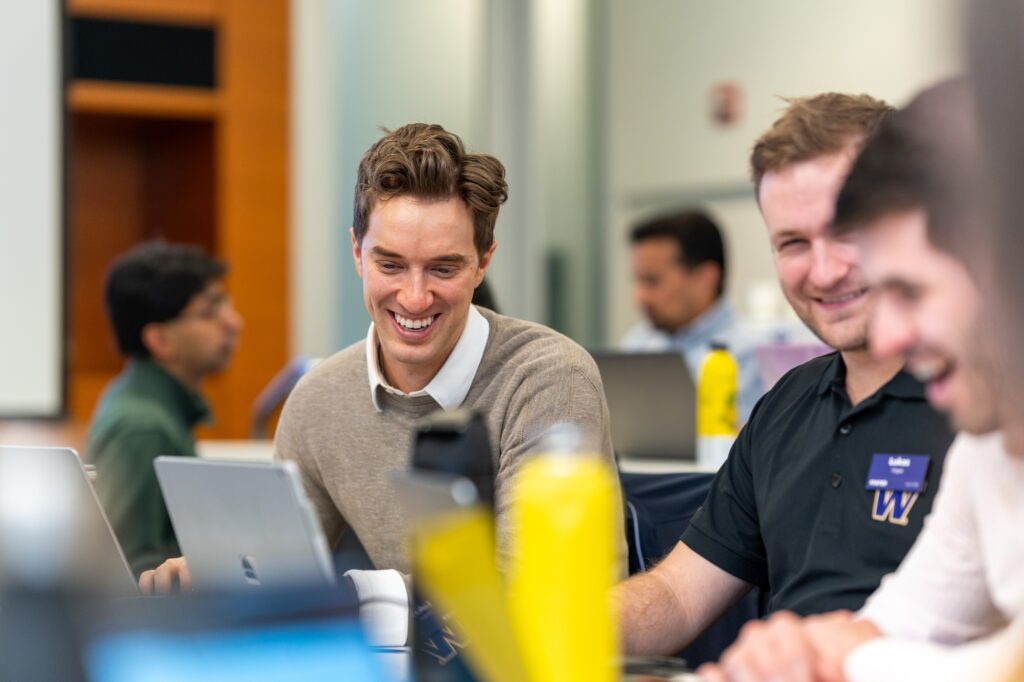
Balancing careers, building futures
The Hybrid MBA at Foster is designed for professionals like Grigg, who are actively shaping their industries but know there’s more to learn. The MBA program allows students to stay rooted in their careers while gaining foundational business and leadership skills. Students learn online during the week and then meet in Seattle once a quarter for immersive, face-to-face sessions and classes known as Foster Together.
So, why would someone balancing two demanding careers add an MBA?
“I came to the University of Washington MBA program to learn how to scale,” Grigg says. “Scaling the production company means scaling the ethos behind it. Scaling the farm means building sustainability, not just for the land, but for the people who’ve worked with us for decades. I needed the tools to grow both, and do it right.”
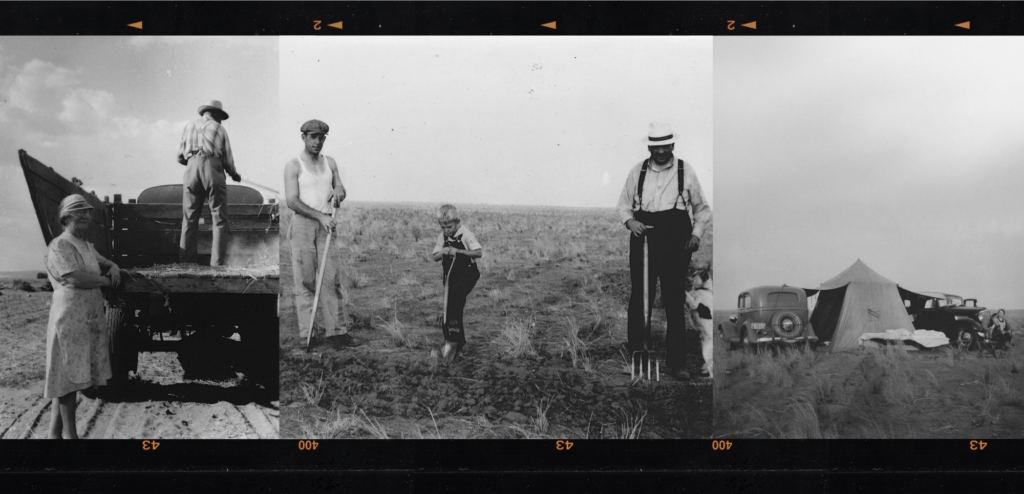
Choosing the Foster MBA: values that align
Grigg knew an MBA would take both businesses to the next level. But he also knew he couldn’t step away from them to pursue it. “I couldn’t take a break now that the production company was rolling. And our employees at the farm deserve change now, not years from now.” He started by reading university mission statements. Foster’s “together… we foster leaders… progress… insights” struck a chord.
“That word – together – stood out,” Grigg says. “My production company is based on the same ethos: creating content with rather than just in communities. Foster’s collaborative spirit matched what I was already trying to build.”
Since joining the program, that theme of working together hasn’t just felt like a value; it’s become a catalyst. “That spirit has directly and positively impacted my trajectory,” he says. “It’s transformed how I lead, how I collaborate, and how I grow both the farm and the production company. It’s a major reason why I’ve enjoyed the program so much.”
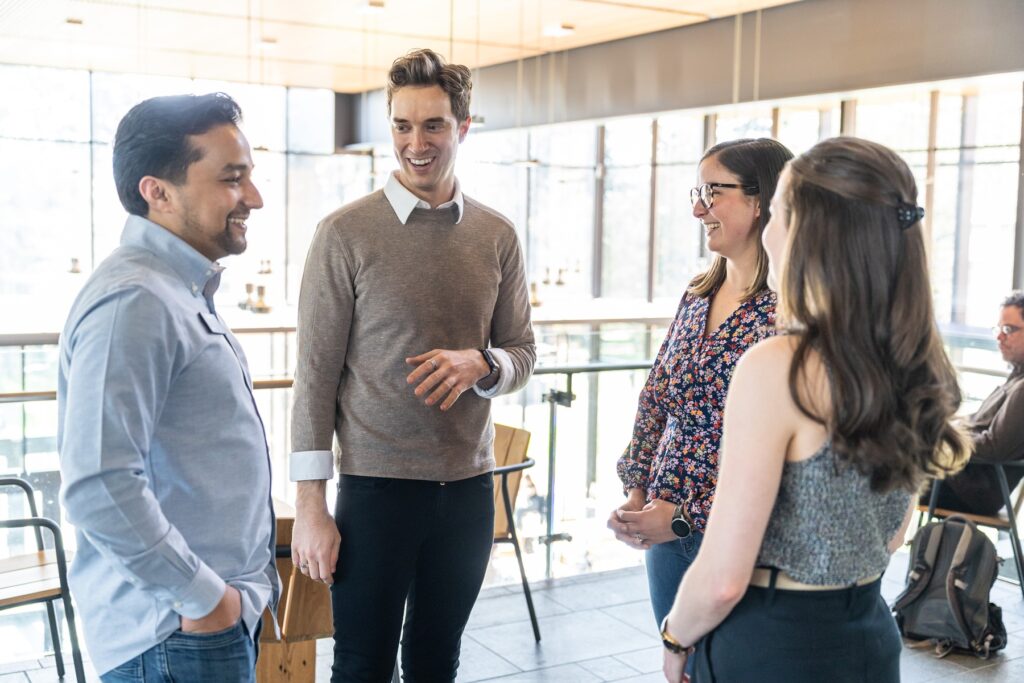
Cohort connections at MBA immersion week
Each quarter, students travel to Seattle for Immersion Week, a cornerstone of the program. We shadowed Grigg on a Friday in Spring Quarter to see what a typical immersion day looks like.
A day in the life of a hybrid MBA student
On this particular day, Grigg had just arrived from central Washington, ready to reunite with his Hybrid MBA team. A defining feature of the Hybrid MBA is its cohort-based model and intentional team structure. Grigg was placed on a team with classmates from Washington, Florida, and Alaska—diverse professionals who support each other academically and personally.
They’ve dubbed their group “Team Rubber Duckies,” a nod to the programming concept where talking through a problem out loud (even to a rubber duck) can reveal the solution. “When someone’s stuck, we explain it like we’re talking to a rubber duck. It sounds silly, but it works.” They even have team shirts in the works.
Behind the scenes of Foster Together
At 9 a.m., it was time for Operations Management with Professor Hamed Mamani. Grigg and his classmates dove into a fast-paced mortgage processing challenge: an interactive way to understand how businesses function behind the scenes.
“The faculty here are incredibly engaged,” Grigg explains. “They take a genuine interest in your work and your world.” He recalls bringing a supply chain challenge from his farm to one of his professors, who not only sat down with him to build a model to address the issue but also followed up the next day with additional articles and resources. “That’s the kind of faculty support you get here,” he adds.
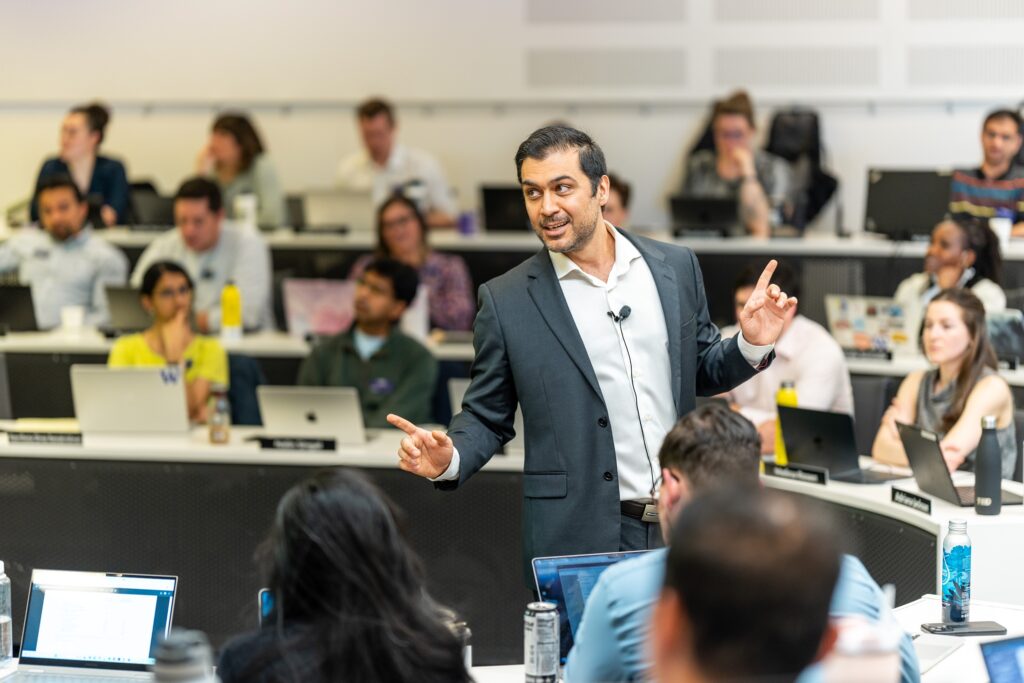
After a mid-morning break, class resumed until 1 p.m., followed by a lively lunch where conversations ranged from supply chains to baby showers to new job offers. “Honestly, this team is my favorite part of the program,” Grigg shares. “We’ve become so close. We push each other, support each other, and really value each other’s missions.”
In the afternoon, he attended Corporate Finance with Professor Lance Young, a class that connects real-world finance examples to foundational concepts. Grigg mentions sharing lessons learned from Young’s class with the administrative team on the farm, as the issues they’re working to resolve are identical to the problems they’re seeing in their case studies in class. “It’s pushing me to my limits as a student, while also instilling information that I can present and discuss with our team the next day.”
After class ended at 6 p.m., the group headed to Flatstick Pub for some well-earned downtime: mini golf, shuffleboard, and plenty of laughs. “Since we spend so much time online or in class together, nights like this are a refreshing way to connect beyond the curriculum.” It’s moments like this, outside the classroom, that really solidify the relationships.”
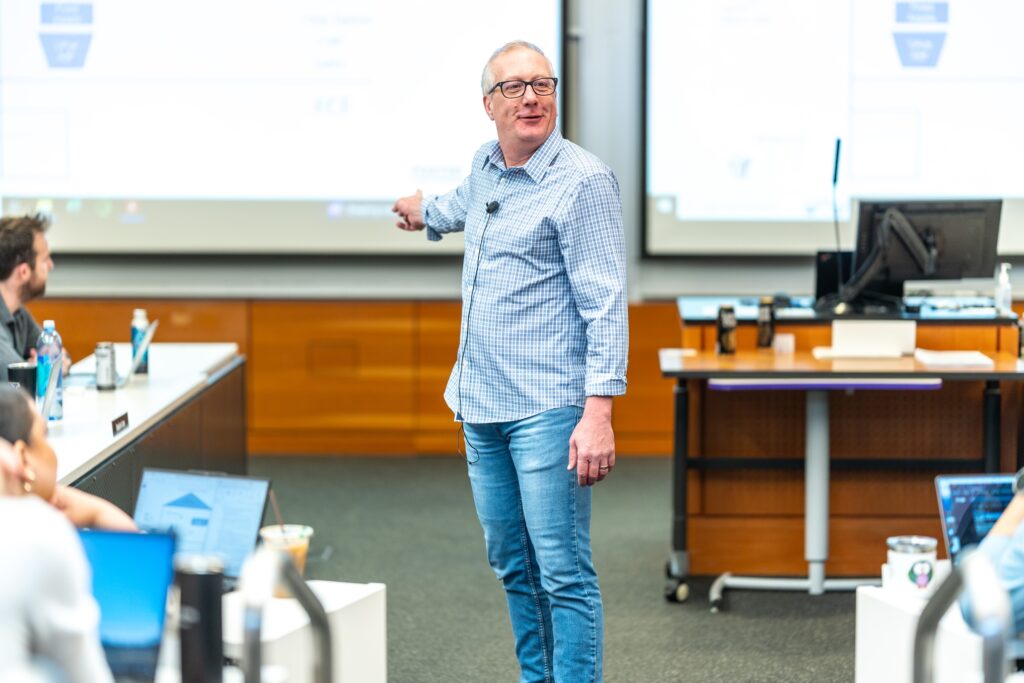
Bringing the MBA classroom to the farm and film set
Grigg isn’t just learning in the program; he’s applying his MBA every day at work. At the farm, he’s introduced policies and procedures that are accessible to all employees. He launched a complaint form system and helped secure a grant to bring ESL classes to the farm, improving communication between workers and leadership.
“The simple changes we’re making are already improving how people work and feel at the farm,” he says. “Foster is helping me make business better in agricultural communities, not just for them, but with them.”
At Circle 3 Productions, his leadership skills have already sharpened. He’s become more intentional about team dynamics and how to scale his mission: to amplify stories from underrepresented communities.
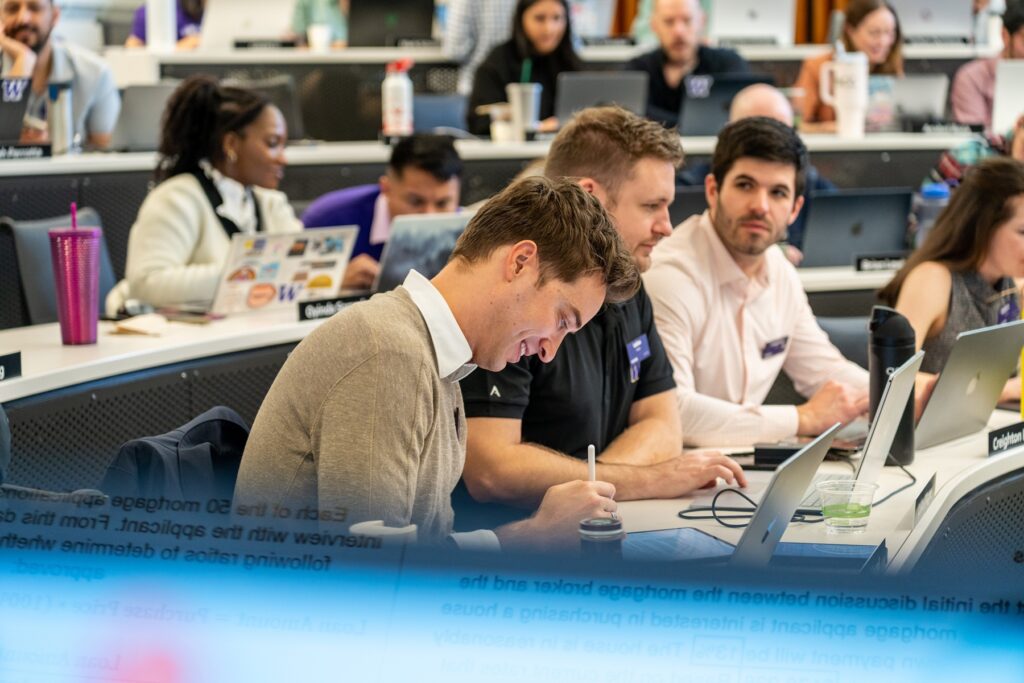
Why Foster’s online MBA format works
“The hybrid MBA is the best of both worlds,” Grigg says. “You don’t have to pause your career. You get to apply what you’re learning in real time. And these in-person immersions are the glue that holds it all together.”
He also values the flexibility of recorded review sessions for complex topics, and the steady presence of program staff who genuinely care about each student’s journey. “They remember your name. They ask about your goals. It’s not just academics; it’s mentorship.”
He also appreciates how each quarter’s coursework builds on the last, like puzzle pieces coming together to form a bigger picture. “Each section starts to relate to the others,” Grigg explains. “You begin to see how everything connects across quarters.”

Finding balance, together
“It’s a rigorous program—there’s not much room to procrastinate,” Grigg says. “But that’s where the team makes all the difference. We lean on each other every week to get through the mountain of work.” With everyone balancing full-time jobs, the support feels personal and earned: “We all understand the sacrifices it takes to be here.”
Grigg’s not just learning from the program—he’s giving back, too. He now mentors incoming Hybrid MBA students, offering the same guidance he once received. “It’s a rigorous program. But you don’t go it alone. You lean on your team, your cohort. And together, you go further than you ever imagined.”
Grow your career with a Hybrid MBA. Learn more here.

